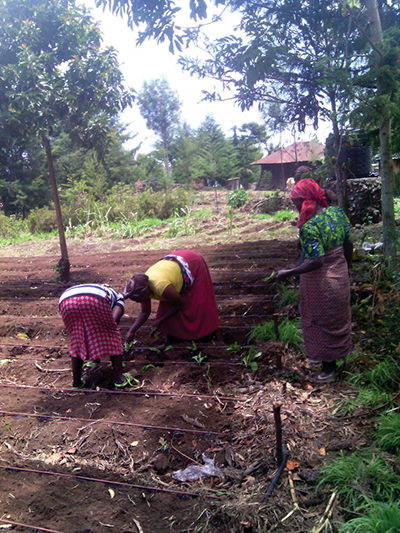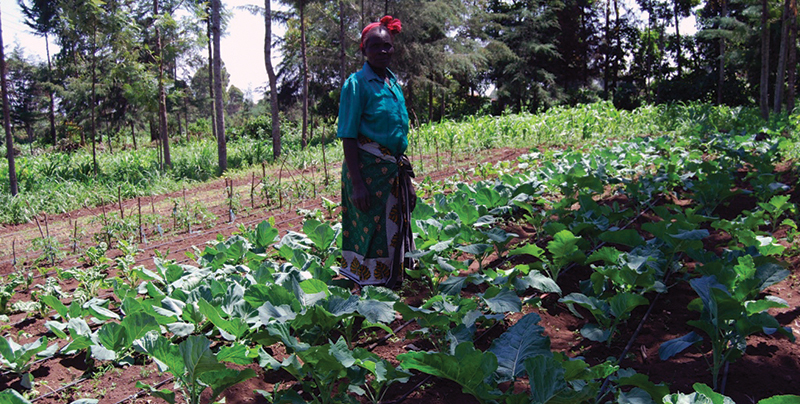PEI NGO working to enhance food security in Kenya
On the surface, Kenya and Prince Edward Island may seem worlds apart, but challenges related to farming and food security are a reality for both. PEI’s Farmers Helping Farmers (FHF) has been working with community groups in the African nation to address these issues through education-based projects. Their latest project is an ambitious one aimed at providing the Upendo Women’s Self Help Group of Naari with training and tools to improve their farming practices and, ultimately, achieve sustainable food production for their families and community.
Farmers Helping Farmers was born out of a desire to “bring together farm families from Canada and from developing countries to talk about their issues and challenges,” said Teresa Mellish, the long-time coordinator for Farmers Helping Farmers. Since the first group of 22 Island farmers travelled to Kenya in 1980, the NGO has carried out hundreds of development projects in the country.
Capacity-building is at the heart of the approach Farmers Helping Farmers takes when working with Kenyans, explained Ken Mellish, chair of the FHF Agricultural Project Committee. Usually, this starts with improving water access. In Naari, the 35 Upendo women grow on small plots of land to feed their family an assortment of vegetables, including cabbage, carrots, potatoes, tomatoes, as well as maize and beans. They rely on rains in November and March to nourish the plants, however with rainfall becoming less reliable, crop failure is occurring more often. The result is severe food insecurity and hunger for the women and their families.

Submitted photo
With financial donations from the Island community, FHF has been able to provide the Upendo group with 1000L tanks for water storage and drip irrigation hoses to water their vegetable crops. Access to these reliable and consistent sources of water is necessary for healthy and productive vegetable gardens. By most Canadians’ living standards, these tanks and hoses represent a small expense, but they are beyond the means of the Upendo women.
Agricultural training is the next step in capacity-building and is led by FHF’s Kenyan staff. Hands-on training is provided in sustainable agriculture practices such as diversifying and rotating crops, and composting to improve soil quality. Improving crop yields is important in ensuring food security as well as providing the women with an income through the sale of excess produce. Many of the Upendo women, who also received FHF training in keeping farm and financial records, reported profits of 10,000 Kenyan shillings (approx. $150CAD) from selling their excess harvest.
To complete the ‘farm to fork’ chain, women are given guidance on how to maximize the nutritional value of the crops they use in their meals. Under the leadership of UPEI’s Dr. Jennifer Taylor, several nutrition students have completed 3-month internships with FHF in Kenya.
“These internships are transformative for students, not to mention the food security and health benefits for the women and their families” said Taylor. The students working with the Upendo women are using a ‘train the trainer’ approach to teach nutrition. The women selected as ‘champions’ or ‘champs’ learn about the nutritional value content of the vegetables, food preparation methods that best retain vital nutrients, and recipes to add these vegetables to their typical meals. They are then tasked with sharing what they learn with the rest of the group and the broader community.

Submitted photo
Farmers Helping Farmers’ 37-year legacy of helping Kenyans improve their agricultural practices and thus their food security is a testament to the generous support of Islanders and the tireless efforts of its volunteers, including several that travel to Kenya each year to provide assistance with the organization’s projects. The annual Souris Village Feast hosted by Chef Michael Smith and a series of Fall Harvest luncheons hosted by Chef Emily Wells each year are two tasty ways that Islanders can support the organization and learn more about its work in Kenya.
- Lending a Helping Hand - April 1, 2017


